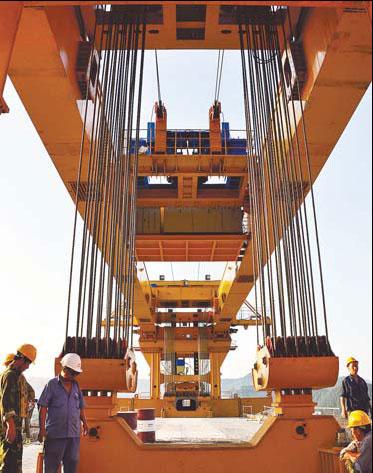
Rail workers in Jiangxi province. The Ministry of Railways began the sale of 20 billion yuan ($3.1 billion) of bonds on Wednesday. [China Daily]
China's Ministry of Railways began to sell 20 billion yuan ($3.1 billion) of bonds on Wednesday, offering a 50 percent reduction in taxes on the interest income to offset rising financing costs caused by the negative investor reaction to a fatal train crash in July.
The offer was split evenly between seven- and 20-year securities.
The issue was the first tranche of 100 billion yuan in railway construction bonds to be issued by April 2012, according to a statement on the website of China Central Depository and Clearing Co Ltd, the Chinese government's bond clearing house.
According to the Wall Street Journal, the rail operator, the nation's biggest issuer of corporate debt, was scheduled to issue the 20 billion yuan in bonds before the Oct 1 National Day holiday.
However, the newspaper said, it suspended the issue at the last moment, a move seen by analysts as an attempt to avoid a pre-holiday spike in interest rates as other borrowers rushed to raise funds.
The latest bond sale came after the Ministry of Finance said on Monday that companies investing in rail bonds issued between 2011 and 2013 will get a 50 percent tax break on interest earnings.
Lu Zhengwei, chief economist with Industrial Bank Co, said the move is a sign of the railway ministry's quasi-sovereign status. The rail bonds are the only ones to offer a tax break, apart from those issued by the national or local governments.
"It will facilitate future bond issues by railway authorities ... and help re-evaluate the value of railway bonds," Lu said.
The 10-year borrowing cost for the railways ministry has jumped 51 basis points to 6.1386 percent since two high-speed trains collided on July 23 in the eastern city of Wenzhou, killing 40 people.
Sealand Securities Co Ltd estimates that the tax policy will save 2 billion yuan for the bondholders, with the amount probably exceeding 30 billion yuan over the next two years as the entire schedule of bond issues is carried out.
However, considering that big banks are tightening their lines of credit for the railways ministry, and that institutional investors remain concerned about investment in railway bonds, the effect of the tax policy on the ministry's financing difficulties will be "limited", Lu said.
China Chengxin International Credit Rating, a rating agency 49 percent owned by Moody's Investor Service, rated the bonds at its highest level, AAA, citing policy support as the main competitive advantage of the issue.
But the agency also warned about the impact of the growing financing scale on the ministry.
A report by China Merchants Securities Co Ltd showed that the railway ministry's bank loans rose from 120 billion yuan in 2008 to 700 billion yuan in 2010.
Meanwhile, it said, pending debt has grown to 570 billion yuan at present, compared with 383 billion yuan in 2009. Pending debt is debt on which payments have yet to begin.
"2012 will be the peak year for the ministry to repay its debt, when just the payments due will be more than 100 billion yuan," the report said, adding that frequent short-term bond issues in recent months have reflected the ministry's financing difficulties.
Bonds have played an important role in financing for the ministry but at a growing cost, and it is urgent for the ministry to explore new financing channels such as the stock market, it said.





